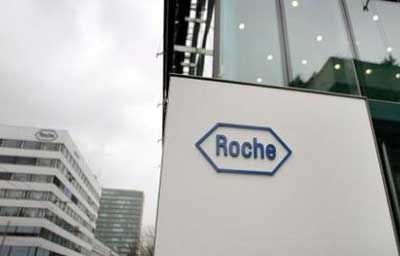Swiss flu medicine company sees stock rise with outbreak
 Geneva - The Swiss pharmaceutical giant Roche, maker of influenza medication Tamiflu, saw its stock price rise 3.6 per cent in trading late Monday afternoon on the Zurich exchange on the back of the global swine flu outbreak. During the avian flu epidemic the drug was used heavily, particularly in South Asia.
Geneva - The Swiss pharmaceutical giant Roche, maker of influenza medication Tamiflu, saw its stock price rise 3.6 per cent in trading late Monday afternoon on the Zurich exchange on the back of the global swine flu outbreak. During the avian flu epidemic the drug was used heavily, particularly in South Asia.
Shares in Roche were trading at close to 145 Swiss francs (126 dollars), up over five francs since the opening.
"It is very difficult at the moment to make clear predictions as we do not yet have a pandemic. The situation is classified as potentially a pandemic, but this is not yet the case," said Thomas Kaufmann, a pharma analyst at Credit Suisse Private Banking.
"The two obvious companies to benefit would be Roche with Tamiflu and GlaxoSmithKline with Relenza," he noted, referring to the main drugs on the market, though other companies were also developing possible treatments.
Martina Rupp, a spokeswoman for Roche, said Tamiflu was deemed to be effective against the swine variant.
"Tamiflu can always be used," she explained, noting that as an antiviral, unlike vaccines, it did not need to be adjusted to specific strains of flu.
Relenza was also being considered effective, Kaufmann noted.
Furthermore, the outbreak was likely to make governments increase spending on health, particularly in relation to flu, over the longer term.
"Governments might very well increase grants and funding for research," Kaufmann at Credit Suisse said, which "can be very helpful for smaller companies."
"As risk of a pandemic is always here now and is always recurring, there is a high chance of an increase in spending" at the governmental level, particularly when it comes to stockpiling drugs, he said.
South Korea has announced it would double its stockpiles of Tamiflu.
Many countries are still below the WHO recommended reserve supply levels.
The research department at Roche was looking into dosing schemes, checking to see "how much and for how long," meaning how many pills should be taken and over what period, to achieve maximum effectiveness, said Rupp.
In recent years Roche has donated 5 million doses of Tamiflu to the World Health Organisation.
Of these, 2 million were distributed "to stockpiles in countries not yet well prepared" in the developing world, Rupp said.
From the remaining doses, the company had 1.5 million in Switzerland and an identical amount in the US on standby as a "fire-blanket," to be distributed if needed in case of a pandemic.
"We are waiting for WHO to ask us to deploy," Rupp said, noting that the company had the capacity to ramp up production if that was requested by the international organization.
She added that in 2005, the full production capacity was never used.
WHO was preparing for a second meeting of its International Health Regulation Committee, after having convened one session over the weekend.
The World Health Organization and Red Cross officials said the world was better prepared for the current situation of swine flu, owing to steps taken by governments during the avian outbreak, including the stockpiling of needed drugs. (dpa)